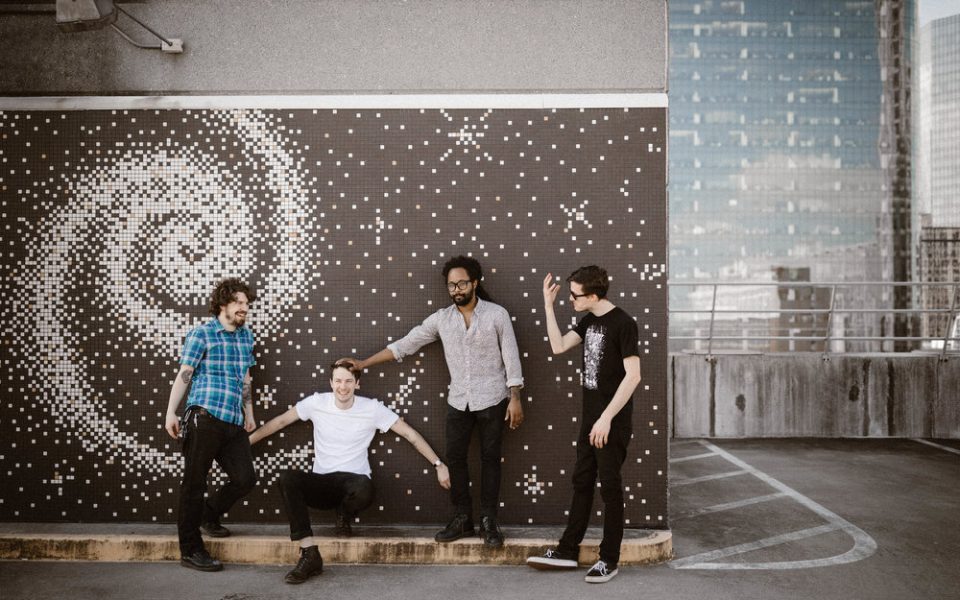Perhaps one of the hardest things for bands to accomplish is making a sophomore album; what’s more, a good sophomore album. There’s an old cliché that says: You have a lifetime to write your first record, but only a year or two for the second. A second LP becomes a test for bands trying to make it in the tumultuous music business. All eyes are suddenly held on every little thing a band does at that point, ready to either discover yet another flash in the pan or “one-album-wonder,” or to realize a band has held up their end of the deal. And Junior Astronomers’ second LP proves grace under pressure.
It’s fitting that the opening track “Body Language Pt. 2” opens with the lyrics, “I didn’t know how things would go.” It is a line that sets the scene for the 10 songs that follow. Body Language, which will be released on Friday, is the band’s realization of how their “home” has changed. Frontman Terrance Richard’s driving force behind the LP is like a breakup with his hometown of Charlotte.
“It’s something like how when you’re in a relationship with someone for so many years and one day you just realize everything is different,” Richard said. “The chemistry between you is off. Nothing has changed exactly, but everything is just different.”
Such tenuous feelings first came to mind after the band returned to their homes after touring for their debut LP Dead Nostalgia. Holding firm to the classic idea of a travelling band seeing the country for the first time and coming home to see that everything — or at least their perspective — has changed, Richard used these themes as the underlining emotions behind Body Language.
The album drives with blistering pace. The drums fit neatly in the pocket, yet carry all the other instruments into a harder, more rock-and-roll realm. Layered on top of this firm foundation are the guitars. Neatly crafted melodies stretch one on top of the other, bringing a woven sound similar to Dire Straits blended with Local Natives. But perhaps the most remarkable thing about the album is Richard’s vocals. On a first listen, you might simply overlook the subtle nuances and ride the wave that the music carries you on. But below the flash, there’s a dark yearning in his voice; a wildness within that screams in a youthful bray of introspective searching and, perhaps, wanderlust.
Most songs remain just under three minutes, adding to a strange urgency that the music creates. With the voice and poetic vision with Richard’s bard-like qualities at the lead, the notions of a tortured soul stuck in a relationship — a relationship with a hometown — seep through, painting a layered image of the overarching idea of body language. But just as these on-the-nose writing subjects and images seem old hat, the artistry begins to shine through; while a first listen of the album provides only a fraction of the experience, what’s weaving the foundation lies under the surface, slowly coming into focus, like a developing photograph.
“Honestly, it was one of the easier records to write,” Richard said. “It all just came out so naturally. And most of these songs we’ve been playing for a few years and so we knew they were ready to be on a record.”
While Body Language has a punk-like resolve to its tone, the band proved prudent in their patience. After putting out five EPs and a debut LP, the band earned interest from Refresh Records, landing them a deal for the long-awaited second full-length album.
“We recorded Dead Nostalgia is a living room with one of our good friends producing it,” Richard said. “And so going into the studio for this one was just an amazing experience.”
Calling in the skilled ear of Mike Pepe (who’s worked with Taking Back Sunday and Modern Chemistry) to produce the record, Body Language was recorded in famed producer Mitch Easter’s acclaimed Fidelitorium studios in Kernersville.
“It was different because Mike really pushed us on this one, he really made it all so much more professional,” Richard said. “Where before we might have just been happy with a take, Mike would come into the booth and say, ‘That was really good guys, I like the direction, but it can be better.’ When we would get frustrated and angry with ourselves and all the rest, Mike would just be there to keep us focused and keep pushing us.”
The album lends itself to a more marketable sensibility, a somewhat watered-down version of a post-punk, indie revival that takes few risks. Where a moment could arise for a breakout of some new moment in modern music, the songs only play it safe, trapping themselves in a form of palatable, boring radio songs.
But even though the fast-paced, firecracker form with which these tracks unleash through the stereo might at first seem simply another band playing to a form, Body Language gets trapped in your head, each song earning its place on repeat.
Join the First Amendment Society, a membership that goes directly to funding TCB‘s newsroom.
We believe that reporting can save the world.
The TCB First Amendment Society recognizes the vital role of a free, unfettered press with a bundling of local experiences designed to build community, and unique engagements with our newsroom that will help you understand, and shape, local journalism’s critical role in uplifting the people in our cities.
All revenue goes directly into the newsroom as reporters’ salaries and freelance commissions.


Leave a Reply